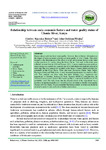| dc.description.abstract | Human related activities harm water quality. However, there is limited information on
the impact of socio-economic activities on water quality in River Chania. This study
focused on the determination of the effect of social and economic factors on the water
quality condition of a section along the River Chania. Data used in this study were
collected between October 2020 and January 2021. A survey employing cross-sectional
survey design was carried out. A sample size of 60 individuals was randomly selected in
study sites that were purposively sampled on the basis of human-related activities that
potentially pollute River Chania. These sites were: Karimenu, Chania Estate Bridge,
Ngoingwa Estate and Thika town. A semi-structured questionnaire was used to collect
data. Data analysis was done using descriptive statistics (e.g., frequencies and
percentages) in Statistical Package for Social Sciences (SPSS) to determine how the
different socio-economic factors affect water quality at a statistical significance of 5%
probability level. The study found that the education level of the respondents was a
positive and significant predictor of the ability of an individual to identify water quality
changes in River Chania. It is recommended that human-related perturbations should be
minimal to protect water quality from further deterioration. | en_US |

